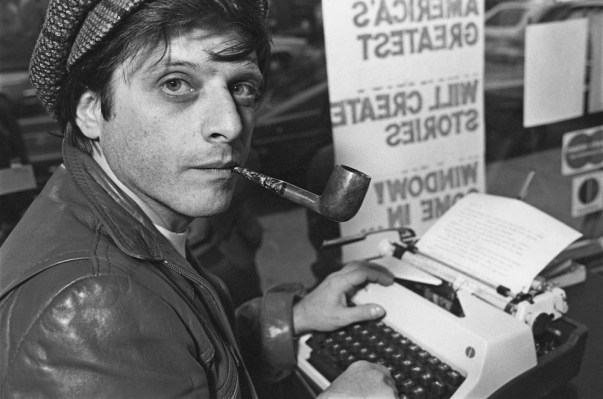Harlan Ellison, the 84-year-old author of some of science fiction’s best-known stories, has died. His death was announced on Twitter by Christine Valada.
In addition to short fiction, Ellison also wrote for the movies and TV, most notably penning “The City on the Edge of Forever” — he was vocal about his dissatisfaction with how his script was rewritten, but the filmed version is still generally considered the finest episode of any Star Trek series.
Ellison also made his mark as an editor, thanks to his 1967 anthology “Dangerous Visions” — while the stories’ sex and violence, as well as their stylistic experimentation, may no longer seem quite as groundbreaking, “Dangerous Visions” remains the definitive collection of New Wave science fiction.
He was also a teacher, most notably championing the work of “Kindred” author Octavia Butler after meeting her at the Clarion Workshop. And he experimented with other media as well, for example working on the computer game adaptation of his story “I Have No Mouth, and I Must Scream” and even providing the voice of the game’s evil AI.
But the stories were his greatest accomplishment. Tales like “‘Repent, Harlequin!’ said the Ticktockman” (about a future where being late is the greatest crime) and “The Deathbird” (a man witnesses the dying Earth’s final moments) and “Pretty Maggie Moneyeyes” (the saddest Las Vegas ghost story you’ll ever read) won him many awards, and have been anthologized many times. They show a pessimistic imagination at work — his most famous stories generally end in death or defeat — but thanks to the tremendous energy of Ellison’s writing, they’re never dour or boring.
Susan Ellison has asked me to announce the passing of writer Harlan Ellison, in his sleep, earlier today. “For a brief time I was here, and for a brief time, I mattered.”—HE, 1934-2018. Arrangements for a celebration of his life are pending.
— Christine Valada (@mcvalada) June 28, 2018
Ellison was a hero of mine, especially when I was younger. He seemed like the kind of writer I wanted to be when I grew up, someone who could be wildly creative while remaining passionately engaged with the world’s real problems. In fact, I wrote an entire college application essay about how I wanted to be him — and later, when I had to write an adventure game for class, I borrowed shamelessly from the post-apocalyptic, underground suburbs of his story “A Boy and His Dog.”
(I wasn’t the only one who cribbed from Ellison, and the extent of that debt was sometimes the subject of legal dispute. After seeing similarities with his short story/”Outer Limits” script “Soldier,” Ellison sued the makers of “The Terminator” — they settled, and his name was added to the credits.)
It’s been a while since Ellison was in the spotlight. He hasn’t written much in recent years, and since his reputation rested on short stories, he didn’t have a novel like “Dune” or “Stranger in a Strange Land” or “The Left Hand of Darkness” sitting on bookstore shelves, making it easy for new readers to discover him.
Ellison never seemed to back down from a fight — not for nothing was a recent biography titled “A Lit Fuse” — so when he did get attention recently, it was usually because he’d said or done something offensive or dumb, most notably in an incident at the Hugo Awards. I’d be lying if I said these controversies didn’t diminish my opinion of him.
But the stories remain. For those who’ve read and loved them, what they’ll remember — what I’ll remember — is the strange hum of the Ticktockman, the laughter of the mad AI ruling over the ruins of the Earth and a gambler’s tired eyes staring out from a haunted slot machine.
